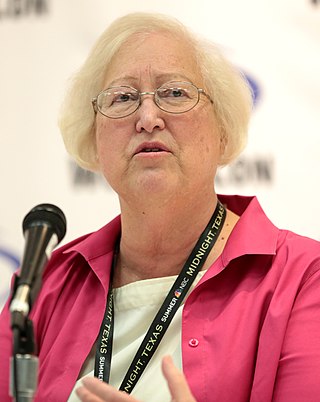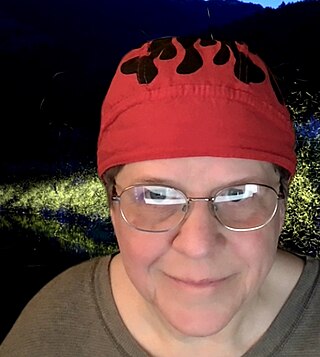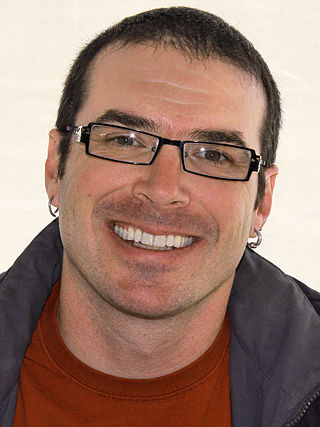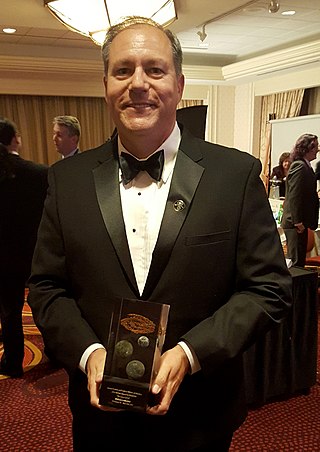Related Research Articles

Gregory Dale Bear was an American science fiction writer. His work covered themes of galactic conflict, parallel universes, consciousness and cultural practices, and accelerated evolution. His last work was the 2021 novel The Unfinished Land. Greg Bear wrote over 50 books in total.

Gene Rodman Wolfe was an American science fiction and fantasy writer. He was noted for his dense, allusive prose as well as the strong influence of his Catholic faith. He was a prolific short story writer and novelist, and won many literary awards. Wolfe has been called "the Melville of science fiction", and was honored as a Grand Master by the Science Fiction and Fantasy Writers of America.

Joe William Haldeman is an American science fiction author.

Michael Swanwick is an American fantasy and science fiction author who began publishing in the early 1980s.

Catherine Ann Asaro is an American science fiction and fantasy author, singer and teacher. She is best known for her books about the Ruby Dynasty, called the Saga of the Skolian Empire.

Constance Elaine Trimmer Willis, commonly known as Connie Willis, is an American science fiction and fantasy writer. She has won eleven Hugo Awards and seven Nebula Awards for particular works—more major SF awards than any other writer—most recently the "Best Novel" Hugo and Nebula Awards for Blackout/All Clear (2010). She was inducted by the Science Fiction Hall of Fame in 2009 and the Science Fiction Writers of America named her its 28th SFWA Grand Master in 2011.
The Nebula Award for Best Script was given each year by the Science Fiction and Fantasy Writers Association (SFWA) for science fiction or fantasy scripts for movies or television episodes. Awards are also given out for published literary works in the novel, novella, novelette, and short story categories. The Nebula Award for Best Script was awarded annually from 1974 through 1978, and from 2000 through 2009. It was presented under several names; in 1974, 1975, and 1977 the award was for Best Dramatic Presentation, while in 1976 the award was for Best Dramatic Writing. The award was discontinued in 2010 and replaced with Ray Bradbury Nebula Award for Outstanding Dramatic Presentation; this award was not originally a Nebula but was made one retroactively in 2019, and is presented at the Nebula Awards Ceremony and follows Nebula rules and procedures. The Nebula Awards have been described as one of "the most important of the American science fiction awards" and "the science-fiction and fantasy equivalent" of the Emmy Awards.
The Nebula Award for Best Short Story is a literary award assigned each year by Science Fiction and Fantasy Writers Association (SFWA) for science fiction or fantasy short stories. A work of fiction is defined by the organization as a short story if it is less than 7,500 words; awards are also given out for longer works in the categories of novel, novella, and novelette. To be eligible for Nebula Award consideration a short story must be published in English in the United States. Works published in English elsewhere in the world are also eligible provided they are released on either a website or in an electronic edition. The Nebula Award for Best Short Story has been awarded annually since 1966. The award has been described as one of "the most important of the American science fiction awards" and "the science-fiction and fantasy equivalent" of the Emmy Awards.

Kate Wilhelm was an American author. She wrote novels and stories in the science fiction, mystery, and suspense genres, including the Hugo Award–winning Where Late the Sweet Birds Sang. Wilhelm established the Clarion Workshop along with her husband Damon Knight and writer Robin Scott Wilson.
Michael Lawson Bishop was an American author. Over five decades and in more than thirty books, he created what has been called a "body of work that stands among the most admired and influential in modern science fiction and fantasy literature."

Nina Kiriki Hoffman is an American fantasy, science fiction and horror writer.

Esther Mona Friesner-Stutzman, née Friesner is an American science fiction and fantasy author. She is also a poet and playwright. She is best known for her humorous style of writing, both in the titles and the works themselves. This humor allows her to discuss with broader audiences issues like gender equality and social justice.

Martha Wells is an American writer of speculative fiction. She has published a number of science fiction and fantasy (SF/F) novels, young adult novels, media tie-ins, short stories, and nonfiction essays on SF/F subjects; her novels have been translated into twelve languages. Wells is praised for the complex, realistically detailed societies she creates; this is often credited to her academic background in anthropology.

Paolo Tadini Bacigalupi is an American science fiction and fantasy writer. He has won the Hugo, Nebula, John W. Campbell Memorial, Compton Crook, Theodore Sturgeon, and Michael L. Printz awards, and has been nominated for the National Book Award. His fiction has appeared in The Magazine of Fantasy & Science Fiction, Asimov's Science Fiction, and the environmental journal High Country News. Nonfiction essays of his have appeared in Salon.com and High Country News, and have been syndicated in newspapers, including the Idaho Statesman, the Albuquerque Journal, and The Salt Lake Tribune.

The Nebula Awards annually recognize the best works of science fiction or fantasy published in the United States. The awards are organized and awarded by the Science Fiction and Fantasy Writers Association (SFWA), a nonprofit association of professional science fiction and fantasy writers. They were first given in 1966 at a ceremony created for the awards, and are given in four categories for different lengths of literary works. A fifth category for film and television episode scripts was given 1974–78 and 2000–09, and a sixth category for game writing was begun in 2018. In 2019 SFWA announced that two awards that were previously run under the same rules but not considered Nebula awards—the Andre Norton Award for Middle Grade and Young Adult Fiction and the Ray Bradbury Award for Outstanding Dramatic Presentation—were to be considered official Nebula awards. The rules governing the Nebula Awards have changed several times during the awards' history, most recently in 2010. The SFWA Nebula Conference, at which the awards are announced and presented, is held each spring in the United States. Locations vary from year to year.

Jason Sanford is an American science fiction author whose 2022 novel Plague Birds was a finalist for the Nebula and Philip K. Dick Awards. He's also known for his short fiction, which has been published in Interzone, Asimov's Science Fiction, Analog Science Fiction and Fact, Year's Best SF 14, InterGalactic Medicine Show and other magazines and anthologies.
Rachel Swirsky is an American literary, speculative fiction and fantasy writer, poet, and editor living in Oregon. She was the founding editor of the PodCastle podcast and served as editor from 2008 to 2010. She served as vice president of the Science Fiction and Fantasy Writers of America in 2013.

Nebula Awards 32 is an anthology of science fiction short works edited by Jack Dann. It was first published in hardcover and trade paperback by Harcourt Brace in April 1998.

William Ledbetter is a science fiction writer whose short stories have been published in Fantasy & Science Fiction, Analog: Science Fiction & Fact, Jim Baen's Universe, Writers of the Future, Escape Pod, and other magazines. His novelette "The Long Fall Up" won the 2016 Nebula Award.
References
- ↑ "Brian Plante Home Page". www.sff.net. Archived from the original on 20 February 1999. Retrieved 22 May 2022.
- ↑ "1995 Hubbard Writers/Illustrators of the Future". The Locus Index to SF Awards. June 16, 1995. Archived from the original on May 14, 2008.
- ↑ Friel, Phil (February 1, 2003). "Analog, February 2003". Tangent.
- ↑ "2004 Analog Analytical Laboratory". The Locus Index to SF Awards. April 17, 2004. Archived from the original on May 16, 2008. Retrieved November 9, 2008.
- ↑ Elhefnawy, Nader (June 20, 2007). "Analog, May 2007". Tangent.
- ↑ "Asimov, AnLab Winners Named". Sci Fi UK. May 7, 2008.[ permanent dead link ]
- ↑ "SF/F & Publishing News: AnLab Award winners". Science Fiction and Fantasy Writers of America, Inc. May 8, 2008. Archived from the original on September 6, 2008.
- ↑ "1999 SFWA Nebula Awards Preliminary Ballot" (Press release). Science Fiction and Fantasy Writers of America, Inc. January 14, 2000. Archived from the original on September 25, 2006.